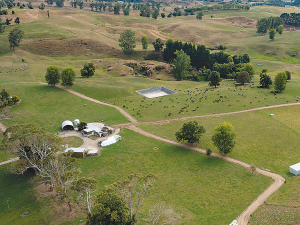Editorial: RMA reforms uproar
OPINION: The euphoria over the Government’s two new bills to replace the broken Resource Management Act is over.
 Some KiwiSaver fund managers oppose allowing young farmers to withdraw funds to buy their first farm. Photo Credit: DairyNZ Facebook Page
Some KiwiSaver fund managers oppose allowing young farmers to withdraw funds to buy their first farm. Photo Credit: DairyNZ Facebook Page
Federated Farmers is brushing aside concerns that the Government's intention to allow farmers to use their KiwiSaver funds to buy a first farm could be problematic.
Feds dairy chair Richard McIntyre told Dairy News that KiwiSaver is designed to help New Zealanders grow their wealth to financially support them in their retirement years, but farmers tend to take a different pathway to financial security.
"For a young dairy farmer that pathway is to get into sharemilking early, build up equity and a herd, and to eventually buy their own farm. It's a well walked progression pathway," he says.
"As they get into their older years, they might choose to bring on a sharemilker themselves, giving another young farmer the same opportunity they had, and the cycle continues."
But Sam Stubbs, co-founder of KiwiSaver fund, Simplicity is warning the Government against allowing farmers to withdraw their KiwiSaver to buy their first farm.
"While it might seem like the existing first home withdrawal, this change is problematic," says Stubbs.
"It could weaken KiwiSaver's core purpose as a retirement savings scheme and offers only marginal benefits to a small group of people, while impacting millions of members."
Stubbs believes the change, if approved by the Government, would have limited impact on farmers.
"KiwiSaver isn't well-suited for self-employed individuals, including many farmers, as it lacks employer contributions and government subsidies have been whittled away over time," he says.
Only an estimated 12,000-25,000 self-employed or employer farmers are KiwiSaver contributors, he points out.
The average KiwiSaver first home withdrawal is about $25,000. This amount is only 0.6% of the average farm price ($3.9 million for a 286-hectare farm), meaning it would offer only marginal help.
"A farm is not a home. Unlike a typical home, a farm (average 286 hectares) is a large business asset," he says.
Finance Minister Nicola Willis signalled at Fieldays that the Government may change the rules to allow farmers to withdraw their KiwiSaver to buy their first farm. However, the Government has poured cold water on a Feds request to allow withdrawals so that sharemilkers could buy their first herd.
Stubbs claims the Government is weakening KiwiSaver for millions.
He notes that this change impacts 3.4 million KiwiSaver members, to benefit at most 0.75% of them.
"KiwiSaver's primary goal is to provide long-term savings for retirement through regular contributions and compounding returns. This proposal risks weakening it from a retirement (and first home) fund to something else.
"If farms are included, what prevents future proposals for other business investments (like a plumbing business or a home-based office)? We need to stop using KiwiSaver as a political plaything. This is not some kind of government/public asset, it's our money."
But McIntyre doesn't think that anyone would be too surprised to hear that kind of thing from "an Auckland-based KiwiSaver fund manager".
"But for the avoidance of doubt, I totally disagree with him.
"What Sam Stubbs is really saying with that statement is that he thinks he can do a better job investing a young farmer's KiwiSaver balance than they can, and that's total nonsense.
"While he might see it as a marginal benefit for a small group, I can tell you that for young people trying to get into sharefarming, the benefits would be significant."
Recent weather events in the Bay of Plenty, Gisborne/Tairawhiti, and Canterbury have been declared a medium-scale adverse event.
DairyNZ's chief executive Campbell Parker says the 2024/25 dairy season reinforces the importance of the dairy sector to New Zealand.
A New Zealand agribusiness helping to turn a long-standing animal welfare and waste issue into a high-value protein stream has won the Australian dairy sector's top innovator award.
OPINION: A bumper season all around.
Dairy Women's Network (DWN) has announced that Taranaki dairy farmer Nicola Bryant will join its Trust Board as an Associate Trustee.
Rural Women New Zealand (RWNZ) says it welcomes the release of a new report into pay equity.
OPINION: Staying with politics, with less than nine months to go before the general elections, there’s confusion in the Labour…
OPINION: Winston Peters' tirade against the free trade deal stitched with India may not be all political posturing by the…